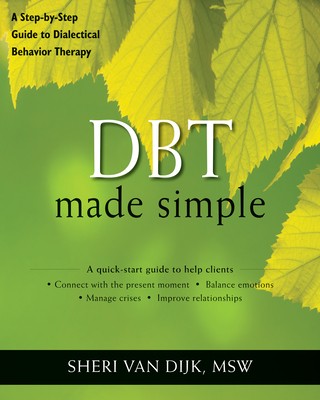
- We will send in 10–14 business days.
- Author: Sheri Van Dijk
- Publisher: New Harbinger Publications
- ISBN-10: 1608821641
- ISBN-13: 9781608821648
- Format: 20.1 x 25.2 x 1.3 cm, minkšti viršeliai
- Language: English
- SAVE -10% with code: EXTRA
Reviews
Description
Originally developed for the treatment of borderline personality disorder, dialectical behavior therapy, or DBT, has rapidly become one of the most popular and most effective treatments for all mental health conditions rooted in out-of-control emotions. However, there are limited resources for psychologists seeking to use DBT skills with individual clients. In the tradition of ACT Made Simple, DBT Made Simple provides clinicians with everything they need to know to start using DBT in the therapy room.
The first part of this book briefly covers the theory and research behind DBT and explains how DBT differs from traditional cognitive behavioral therapy approaches. The second part focuses on strategies professionals can use in individual client sessions, while the third section teaches the four skills modules that form the backbone of DBT: core mindfulness, distress tolerance, emotion regulation, and interpersonal effectiveness. The book includes handouts, case examples, and example therapist-client dialogue--everything clinicians need to equip their clients with these effective and life-changing skills.
EXTRA 10 % discount with code: EXTRA
The promotion ends in 23d.11:24:36
The discount code is valid when purchasing from 10 €. Discounts do not stack.
- Author: Sheri Van Dijk
- Publisher: New Harbinger Publications
- ISBN-10: 1608821641
- ISBN-13: 9781608821648
- Format: 20.1 x 25.2 x 1.3 cm, minkšti viršeliai
- Language: English English
Originally developed for the treatment of borderline personality disorder, dialectical behavior therapy, or DBT, has rapidly become one of the most popular and most effective treatments for all mental health conditions rooted in out-of-control emotions. However, there are limited resources for psychologists seeking to use DBT skills with individual clients. In the tradition of ACT Made Simple, DBT Made Simple provides clinicians with everything they need to know to start using DBT in the therapy room.
The first part of this book briefly covers the theory and research behind DBT and explains how DBT differs from traditional cognitive behavioral therapy approaches. The second part focuses on strategies professionals can use in individual client sessions, while the third section teaches the four skills modules that form the backbone of DBT: core mindfulness, distress tolerance, emotion regulation, and interpersonal effectiveness. The book includes handouts, case examples, and example therapist-client dialogue--everything clinicians need to equip their clients with these effective and life-changing skills.


Reviews